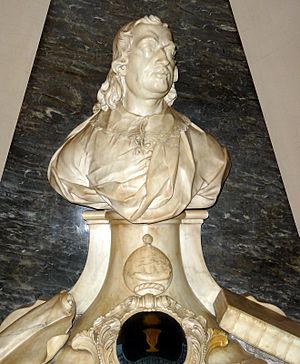Samuel Vassall facts for kids
Samuel Vassall (1586 – 1667) was an English businessman and politician. He was a Member of Parliament (MP) from 1640 to 1648. Vassall was also a major owner of the Guinea Company, which started in 1651. He moved from London to America in 1663 when he was 77 years old. Samuel Vassall died in the American colonies in 1667.
Early Life and Family
Samuel Vassall was born in 1586. He was the second son of John Vassall and Anna Russell. His father, John Vassall, was a Huguenot, a French Protestant who came to England. John Vassall helped fight against the Spanish Armada with his own ships. He also invested in the Virginia Company, which helped set up colonies in America.
Samuel Vassall lived in a house called Cockethurst Farmhouse in Prittlewell, Essex, in the early 1600s. This house stayed in the Vassall family until 1808.
His Business Ventures
Samuel Vassall started his career as a merchant for the Levant Company. He traded goods from the Ottoman Empire, like rum, spices, cloth, tin, and pewter, across Europe. By the late 1620s, he began supplying food and goods to the American colonies of Virginia and Barbados. He became one of London's main importers of tobacco from the Chesapeake region.
In 1628, Samuel and his brother William Vassall helped create the Massachusetts Bay Company. They also gained ownership of a large part of Massachusetts in New England.
Samuel Vassall faced problems with taxes. In 1628, he was put in prison because he refused to pay a tax called "tonnage and poundage" on goods he was importing. He continued to challenge these taxes in the following years.
In 1630, Vassall tried to start a colony in what is now South Carolina. He was supposed to transport people and supply the new colony. However, the colonists were accidentally taken to Virginia instead. This mistake caused Vassall to pay a large amount of money in damages.
Both Samuel and William Vassall were very active in setting up English colonies in the Atlantic during the 1600s. Their family's wealth was built partly through their involvement in the slave trade. Samuel Vassall worked as an independent trader in the 1640s. He sought to make money from both luxury goods and by trading enslaved Africans. Between 1642 and 1645, and again in 1647, Samuel joined groups that owned ships. These ships traded between the coast of Guinea in Africa and the Caribbean, bringing enslaved people to Barbados.
In 1651, Samuel Vassall became the leader and main owner of the Guinea Company. This company bought and sold enslaved Africans. For example, in 1651, the company told a ship captain to "put aboard...so many negers as your ship can carry" for enslavement. Another instruction said, "We pray you buy as many lusty negers as she will can carry, and so despatch her to the Barbadoes." His brother William owned a sugar plantation in Barbados, where enslaved people were forced to work. The Vassall family built their wealth for nearly 200 years by running plantations in the Caribbean that relied on enslaved labor. Records show that the Vassalls owned 18 plantations in Jamaica and enslaved at least 3,865 people.
His Time in Politics
In April 1640, Samuel Vassall was chosen to be a Member of Parliament (MP) for the City of London. This was during a time known as the Short Parliament. Later that year, in November 1640, he was re-elected as an MP for the City of London in the Long Parliament. He served until 1648.
Vassall spoke to the House of Commons about his complaints, especially about the taxes he had to pay. In 1641, the House of Commons ordered that his tobacco, which had been taken by tax collectors, should be returned to him.
During his time as an MP, Vassall was involved in several important committees. In 1642, he was a commissioner for plantations in the American colonies. He helped appoint Sir Thomas Warner as governor of the Caribbee Islands. In 1643, he was a commissioner for the Providence plantations in New England.
Vassall also helped raise money for the Scottish army in 1645. In 1646, he was named a commissioner to help keep peace between England and Scotland. In 1650, he provided information to Parliament about problems between merchants and the Guinea Company.
Vassall tried for many years to get compensation for his losses and imprisonment due to the tax disputes. In 1647, the House of Commons voted to pay him a large sum of money, but he never received it. He continued to petition for payment, even while he was in prison in 1658.
Later Life and Family
In 1663, Vassall traveled to Carolina to discuss a land claim with the colony's owners. He likely died in Massachusetts, but the exact time or place is not known. When his son Francis was granted permission to manage his affairs in London in 1667, it was stated that Samuel Vassall had died abroad.
Samuel Vassall married Frances Cartwright. They had several children together.
 | James B. Knighten |
 | Azellia White |
 | Willa Brown |


